I have been to India twice to help manufacture microscopes for Labotron. They are in the little town of Ambala, Cantonment. The scientific industry is concentrated in Ambala and many common medical and scientific gadgets are made there.
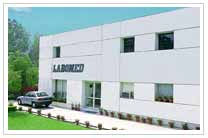 LaboAmerica
LaboAmerica
Labomed
The people of India are amazing. It is a poor country, the infrastructure is overtaxed, it is crowded. Even with all this advesity, they find happiness in their families, their work, and their lives. It is an inspiration to see the poorest people in brightly colored saris smiling as they go about their day.
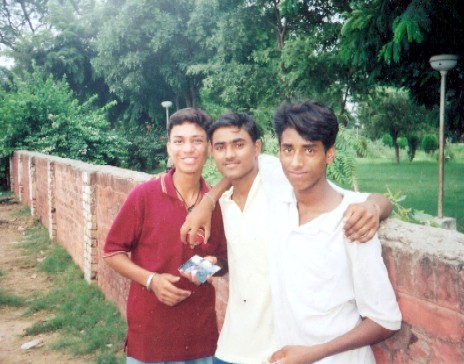
At first, Labotron had me stay in the town of Chandigar and a driver picked me up in the morning and delivered me back to the hotel in the evening. It was a pretty nice place, but the drive every day was absolutely terrifying. The traffic in India consists of cars, busses, trucks, bicycles, oxcarts pedestrians and every other manner of conveyance. All are moving in different directions and at different speeds. In addition to driving on the left, nobody obeys any of the rules of the road and everybody is trying to move at maximum speed. Cars will go three wide passing slower traffic. The only thing that prevents catastrophe is the implied understanding that everybody wants to make it home at the end of the day. So, the rules are basically give and take.
After a couple weeks of white-knuckled
commuting, I decided to buy a bicycle and live in the town of Ambala. The
hotel was not as nice, but it was pleasant to ride my bicycle to the factory
every day. The most common type of bike is a traditional British design
that has a nifty linkage system to actuate the brakes.
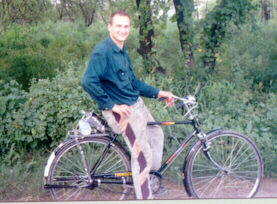 I loved this bicycle. Since it couldn't be shipped back to the United
States at the end of my stay, I gave it to one of the factory servants. He
was still riding it when I came back a couple years later. The paint had
faded and the markusfarkus had mostly worn away, but it was still in daily
operation.
I loved this bicycle. Since it couldn't be shipped back to the United
States at the end of my stay, I gave it to one of the factory servants. He
was still riding it when I came back a couple years later. The paint had
faded and the markusfarkus had mostly worn away, but it was still in daily
operation.
There is a completely different delivery system for food in India. The
method for delivering milk was particularly interesting. Refrigeration
isn't widely available and the people prefer to eat fresh food rather than
processed, preserved, or frozen commodities. The milk is delivered daily
to households by a fleet of motorcycles that are specially equipped to carry
milk cans. The cows are free to roam the city during the day. They
are rounded up and herded to a building where they are milked and fed for the
night. The milk from these dairies is either delivered directly or moved
to a central collection facility that makes cheese, butter and yougurt.
The milk is loaded into the milk cans and put on motorcycles for delivery.
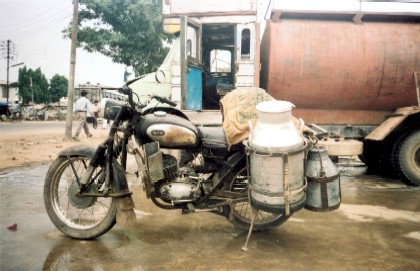 The rider then follows a route and delivers the milk to customers throughout the
area. The milk cans have a tight sealing cap that prevents leakage and a
special dipper cup inside that hangs from the lid. Each scoop holds one
liter of milk. When the delivery person shows up, somebody from the family
comes out with a pitcher or smaller version of the milk can and the rider scoops
out whatever quantity the family wants. He also has a can for cream that
is a smaller version of the milk can. It too has a scoop inside to measure
out the product.
The rider then follows a route and delivers the milk to customers throughout the
area. The milk cans have a tight sealing cap that prevents leakage and a
special dipper cup inside that hangs from the lid. Each scoop holds one
liter of milk. When the delivery person shows up, somebody from the family
comes out with a pitcher or smaller version of the milk can and the rider scoops
out whatever quantity the family wants. He also has a can for cream that
is a smaller version of the milk can. It too has a scoop inside to measure
out the product.
The milk cans themselves are an interesting piece of equipment. They
are a very standardized design throughout the area, and presumably, the country.
The cans are formed from galvanized sheet metal with thicker stock forming
circumferential bands around the base and top. Rivets hold the whole thing
together and the cap fits so tightly that it won't leak even if tipped on its'
side. I found a man that makes the milk cans in Ambala. His shop is
nothing more than a small space with a dirt floor and simple tools. He
sits on the floor and uses his hands and feet to create these milk cans from
sheets and strips of metal. The only tools used are a pair of hand shears,
a hammer, a couple chisels and punches, and a piece of railroad track for an
anvil.
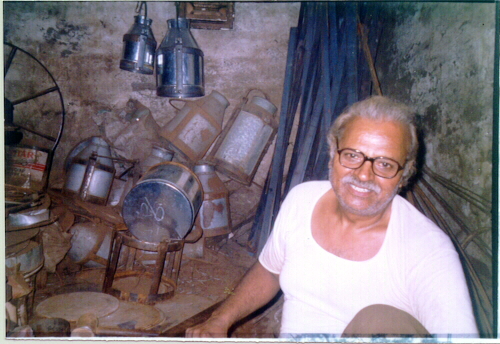 Each piece is cut out using marks on the walls. They are formed, and
riveted on the anvil. Slowly, the whole process comes together into a
finished can, ready for the delivery system. He has probably made
thousands of these creations over his lifetime. They are true works of
art.
Each piece is cut out using marks on the walls. They are formed, and
riveted on the anvil. Slowly, the whole process comes together into a
finished can, ready for the delivery system. He has probably made
thousands of these creations over his lifetime. They are true works of
art.